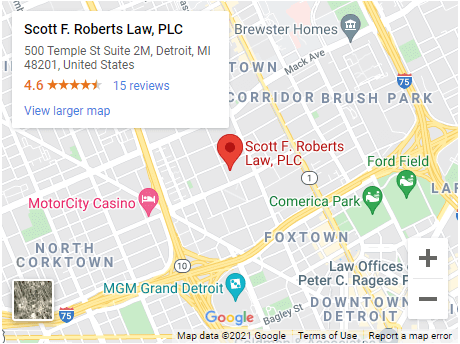Almost every single day we either hear about a new municipal opportunities for businesses looking to site medical marijuana provisioning centers, growing facilities, or processing centers, or we are asked some version of the question “which municipality is best for me MMFLA facility?” While many have attempted to keep track of “who’s in” and “who’s out”—including LARA itself even the easiest to read maps and lists can quickly become overwhelming in the context of choosing the “best” property and location for your medical marijuana business. As more municipalities opt-in to the MMFLA, marijuana companies have more and more properties and municipalities to choose from, which makes identifying the best property for your marijuana business more and more difficult.
Complicating this decision even more is that fact that there is no cookie cutter approach to finding the right municipality. What might be “right” for one company, or one license type, might not be “right” for other companies or license types. For instance, while a rural municipality may seem attractive to growers due to relatively cheap land costs, there may be hidden factors that can effect whether the municipality is the right place for your company. The best example of this is the availability of electricity and utilities. Many rural areas do not have the electrical infrastructure to support a large, Class C grow, but might have more than enough for a smaller Class A and may even be the ideal option for an outdoor grow.
Even though there is not one “right” approach to selecting a municipality to site your marijuana facility, we have used several strategies to help clients select the right property in the right municipality. We like to group these approaches into one of two categories—proactive approaches and reactive approaches. Proactive approaches involve working with the municipality before it decides to opt in, whereas reactive approaches involve identifying municipalities that have already opted in or on taking advantage of public information and rumors to best position your business before a municipality officially votes to opt-in. Each approach has its advantages and disadvantages.
The advantage of being proactive is that you can get “first pick” of the properties in a City, and you can help shape the ordinance to ensure that your properties will be zoned in. The disadvantage to this approach is that it can be costly in terms of money and time. I know clients that have spent dozens of hours talking to cities and townships, only to have most of them be dead-ends. We have also helped clients lobby municipalities, and while the thousands of dollars in costs may be well worth it to certain clients, it may not be a cost effective for many smaller marijuana companies.
The Proactive Approach
The proactive approach involves lobbying the municipality directly in order to persuade the city council or city commission to “opt in” to allowing MMFLA licensed facilities. It can also involve lobbying the municipality to shape that the municipal zoning ordinance applicable to ensure property would be able to be used for the type of Marijuana business you are planning. For example, we helped a large grow facility persuade a sizeable Western Michigan city to opt-in to the MMFLA by working closely with a local economic development corporation, who helped us lobby individual city commissioners. We also sent out targeted mailings to the city commission illustrating the jobs we planned to create and the investment the area would see as a result and called select commissioners we thought could be “champions” of the project. Whether it was the mailings, lobbying, or the City was just plain ready to opt-in with or without us, the end result was that the client was able to select the perfect facility first and then get the municipality to pass an ordinance allowing the client’s facility after the property was put under contract.
While it can be effective for bigger municipalities, this approach is best used for smaller municipalities with more to gain from siting medical marijuana facilities. The way the MMFLA is set up is that municipalities that allow medical marijuana facilities get a cut of the tax revenue, with their cut being in proportion to how many facilities they allow. For large cities like Detroit or Lansing, this may not be a big factor in deciding whether and how to opt in as the revenue sharing would represent a tiny fraction of their budget. For smaller cities in need of revenue, just a few medical marijuana facilities can result in substantial positive changes to the city’s budget. By stressing the economic impact of opting-in, as opposed to moral or ethical arguments–we have successfully helped and are helping clients lobby these small cities. We find that once we are able to get these smaller (and often more conservative) municipalities to get past their own ethical views on Marijuana, and view opting in from a city budget and jobs perspective, it is an easy sell.
Choosing the right way to lobby cities can result in a big difference not only in terms of outcomes but also in terms of what you must pay. There are a few well-known lobbying groups in Michigan that work on medical marijuana issues. However, these groups tend to be incredibly expensive—often charging tens of thousands of dollars—and many times do not have any special connections  to the city. Other consultants may charge less but their influence may be limited to certain geographic areas or members of only one political party. For example, we utilize a municipal consultant who is highly effective in lobbying cities in Southeastern Michigan, and has strong ties to the City of Lansing, but whose effectiveness drops drastically outside these two areas.
to the city. Other consultants may charge less but their influence may be limited to certain geographic areas or members of only one political party. For example, we utilize a municipal consultant who is highly effective in lobbying cities in Southeastern Michigan, and has strong ties to the City of Lansing, but whose effectiveness drops drastically outside these two areas.
While some business owners may benefit from hiring a professional lobbyist or consultant to attend the meetings with public officials or council meetings, others are more than capable of effectively doing this themselves. Many lobbyists and consultants will try to persuade business owners that only they can lobby municipalities, or that only they know the “secret sauce” that will persuade city officials to come around. This is total and utter crap. The key is simply finding a message or idea that will resonate with the officials and the community as a whole. In our experience, rural or conservative areas tend to respond best to economic arguments—i.e. how opting in to the MMFLA will bring jobs, revenue and investment to the municipality. Officials in larger, liberal areas are harder to pigeonhole. In Detroit, for example, certain members of the city council are very receptive to the idea that opting in will bring investment and jobs to the city. Other members, on the other hand, are more responsive to what pastors and church leaders will say and will go along with opting in as long as they have their blessing.
If the business owner is able to communicate clearly and effectively, we have found that some of the most effective lobbying is actually lobbying done by business owner themselves since they are in the best position to discuss their company and what they can do for the municipality. These business owners may still need help crafting arguments and lobbying materials to use at the meeting or getting introductions with the right city officials. But with just a little help, business owners can be just as effective if not more effective than the professional lobbyists who charge tens of thousands of dollars.
The Reactive Approach
Not every business owner has the time, money or inclination to directly lobby cities to opt-in to the MMFLA. Certain cities, Detroit being the best example, are simply too large to lobby effectively, or at least cost effectively. While that may mean the best properties have already been spoken for, it doesn’t mean that you can’t find a good property for your medical marijuana facility. In addition, unless you are going after a highly sought-after provisioning center license, finding a municipality is not as difficult as it seems. Many if not most cities do not limit the amount of growers, processors, secure transporters or safety testing facilities that they allow. Small-scale growers and processors therefore have plenty of opportunities to choose from and plenty more coming online in the near future. Larger growers may have a more difficult time but there are still plenty of options available in many municipalities.
One approach is to simply coast off the lobbying efforts of others. Pontiac, Grand Rapids, and Detroit have all recently announced they are considering municipal ordinances to allow Medical Marijuana facilities. Cities like Detroit and Grand Rapids are simply too big for any one person to have to control the process. While cities the size of Pontiac are small enough that one determined, well-connected person can drive the process, they are still too big for that person to keep it too much of a secret. In these situations, business owners are much better off using that time and effort to locate and secure the best property and put together the best municipal application to give their marijuana business the best chance to secure a license.
Another similar approach is to try to be “in the know”, or at the very least hire people who are. We have clients retain us for this very reason—we hear a lot of rumors about who is going to opt-in before the information makes it into the papers. But just because you know that a municipality will opt-in doesn’t mean you will be able to be ahead of the curve on the specifics needed to best take advantage of the situation. Warren, for example, was long-rumored to be on the verge of opting in. I remember first hearing the rumor myself early last fall. If medical marijuana company jumped on the rumor when it first came out in order to secure the best property, you would have been forced to sit on that property for over 6 months while the city council and mayor went back and forth before finally opting in last month.
Knowing when to pull the trigger, and when to hold off until there is more certainty, is not always an easy or clear-cut decision, and different business owners often have different risk tolerances when it comes to these decisions. One key is knowing how to best tie up the property, while still having an out if the municipality doesn’t act as predicted. Here, having a skilled real-estate broker and an attorney with a strong real-estate background can save you from going down in flames before you even start. Another is to not put all of your eggs in one basket, as we recommended in our previous article on siting medical marijuana dispensaries in Michigan.
The final approach we will discuss is to simply buy an existing facility where the municipal licensing has already been secured or is all but certain to be obtained. Examples of such opportunities include Harvest Park outside of Lansing, Cannabis Park, as well as individual opportunities from specialized Cannabis Brokers. We have a couple clients that actually do this as a business—buy properties, secure licensing, then sell to another marijuana group looking to avoid the hassle of securing the property. The benefits of this approach are obvious—all the work has already been done. The main drawback of this approach is cost. The original buyer needs to make a profit not just off the cost of the real estate but also all the work put into securing the municipal license. That means the costs will be significantly more than if you were to do the work yourself with the assistance of a cost-effective marijuana attorney.
Scott F. Roberts Law, PLC is a Michigan Medical Marijuana Business Law Firm representing commercial cannabis companies throughout the state of Michigan. The Firm primarily represents state-law compliant medical marijuana businesses, as well as Hemp and CBD companies, real estate investors, and ancillary and professional service companies.




